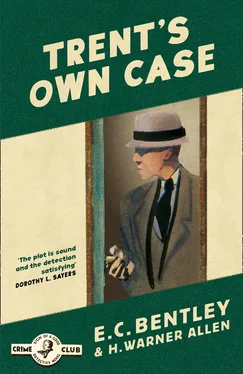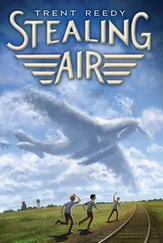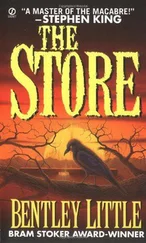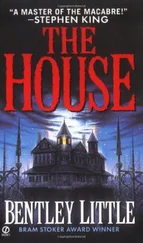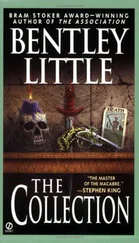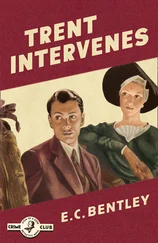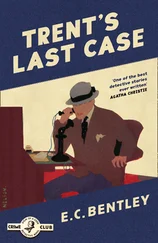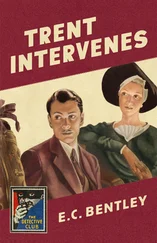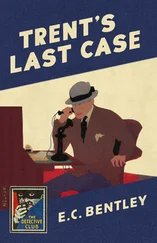Trent stared at him. ‘You don’t mean to say he’s made no bequests to these places that he created, and lavished money on, and that made up a large part of his reputation?’
Verney arose and crossed his arms. ‘I mean this,’ he said harshly. ‘Randolph made no bequests at all. He left no will.’
CHAPTER VI VI. AN ARREST HAS BEEN MADE VII. ON A PLATE WITH PARSLEY ROUND IT VIII. THE WHITE FLOWER OF A BLAMELESS LIFE IX. THE TIARA OF MEGABYZUS X. A MATTER OF TEMPERAMENTS XI. IMPASSE XII. THE COUNT EXPLAINS XIII. FELIX POUBELLE 1884 XIV. GENIUS MUST LIVE XV. EUNICE MAKES A CLEAN BREAST OF IT XVI. THE WHISPERED WORD XVII. FINE BODY OF MEN XVIII. INFORMATION RECEIVED XIX. RESURRECTION XX. A GOLF MATCH XXI. AUNT JUDITH KNITS The Detective Story Club About the Publisher
AN ARREST HAS BEEN MADE VI. AN ARREST HAS BEEN MADE VII. ON A PLATE WITH PARSLEY ROUND IT VIII. THE WHITE FLOWER OF A BLAMELESS LIFE IX. THE TIARA OF MEGABYZUS X. A MATTER OF TEMPERAMENTS XI. IMPASSE XII. THE COUNT EXPLAINS XIII. FELIX POUBELLE 1884 XIV. GENIUS MUST LIVE XV. EUNICE MAKES A CLEAN BREAST OF IT XVI. THE WHISPERED WORD XVII. FINE BODY OF MEN XVIII. INFORMATION RECEIVED XIX. RESURRECTION XX. A GOLF MATCH XXI. AUNT JUDITH KNITS The Detective Story Club About the Publisher
THERE was a momentary silence as Trent took in this amazing statement and its implications.
‘The man who murdered Randolph,’ Verney said, ‘has probably killed half a dozen invaluable charities and other good works stone dead with that same bullet. Besides that, he has dried up completely a great stream of benevolence that spread itself out in all directions. For I am convinced that there is no will; and if there is no will, what is to happen to the Randolph fortune, and to the causes that it supported, heaven alone knows. Somebody will inherit, I suppose; but there will be delay, and who can answer for what he will do with the money? He may prefer horse-racing, or yachting, or play-producing, or any other way of getting rid of money by the cartload. One thing is practically certain; he won’t live on a few thousands a year, and devote the rest to well-directed benevolence.
‘Another thing,’ Verney went on, holding up an expository finger. ‘There may be rival claimants, and a dispute dragging on indefinitely; for as far as I know Randolph had no near relations. You may have heard that he had a son, an only son, who disappeared from home when he was about sixteen, and has never been heard of since. The old man did everything possible to find out what had happened to him, but no trace of him was ever found and he was given up for dead long ago. But there may be other relatives. You see what a disaster the whole thing is likely to be, apart from the personal loss of such a man, and such an influence for good.
‘There is one detail,’ Verney went on after a moment’s pause, ‘of interest to you. Randolph was very anxious that you should paint a replica of the Tabarders’ portrait of him, to be hung in the hall of the Institute. Did you hear about that?’
‘I had a note from him about it,’ Trent said, ‘but nothing was settled.’
‘Well, it never will be now,’ Verney said; and then broke out desperately: ‘I tell you, Trent, the shock and the horror of this business, and the prospect of so much wreckage, have driven me pretty nearly insane.’ And Verney sunk his head between his hands, his fingers clutching his hair.
Trent, while his lips took a dubious twist, put a hand on the young man’s shoulder. ‘Better not meet trouble half-way,’ he said. ‘After all, the whole thing depends on your belief that Randolph had made no will. What grounds are there for thinking that he could have been guilty of such an amazing piece of imprudence as that? It’s really hardly credible.’
Verney, without looking up, shrugged his shoulders. ‘The grounds for thinking so are good enough, unfortunately. The fact is that, at the time of his death, he was really thinking, for the first time, about putting his affairs in order. His lawyers had been dropping hints for a long time that it was high time he made a will. I told him so myself, too, more than once—it was my obvious duty to do so, I thought, though a very unpleasant one. Whenever I did, he made it quite clear that there was no will as yet. He used to say there was time enough, that he was good for many years yet. But he hated the subject being mentioned—didn’t like the idea of dying, I suppose, like many other people; though if any living being had a right to feel confident about his prospects in the next world, Randolph had. And then at last he did begin to consider the thing seriously. Several times he said things that showed me he was thinking about the disposal of his estate. And then, before he had got to the point of doing anything definite, he was struck down.’
Trent thought for a few moments before saying: ‘Still, he may have made a will earlier in life—when he was married, for instance. Men usually do, I believe.’
Verney made a gesture of impatience. ‘He may—yes; when he was a comparatively poor man with no great philanthropic interests to think about. But if he did, I think he would have mentioned it; and anyhow, it’s not to be supposed that the terms of any such will would prevent everything getting into the sort of hopeless mess that I’m thinking about. Then, apart from his own foundations, there are all the causes that had expectations as regards Randolph’s estate—had a right to have them, I mean, seeing that for years he had been a regular and generous supporter of them.’
‘What sort of things do you mean?’ Trent asked. ‘Never having been a philanthropic millionaire, it would interest me to know how it all works—if you won’t think I’m being irreverent to say so.’
Verney looked into vacancy, as one assembling his ideas. ‘Why,’ he said, ‘to put it the simplest way, there must have been dozens of secretaries and chairmen of committees trying, at odd times, to sound me discreetly about what Randolph’s testamentary dispositions were. There’s the Humberstone General Infirmary; and the Humberstone Endowed Schools Foundation; and the Moss Lane Congregational Church of the same place; and the London Missionary Society; and the British and Foreign Bible Society; and the Yorkshire Congregational Union; and the Congregational Pastors Retiring Fund; and Leeds University; and the Scalbridge United Independent College; and the National Lifeboat Institution; and the Harrowby Seamen’s Institute; and the Dewsby Deaf and Dumb Institute; and—oh! I could name another dozen or more that have a direct interest in what happens to Randolph’s estate.’
‘Thanks! Thanks!’ Trent said smiling. ‘You needn’t go on, Verney, I see how it is. I’d no idea your field of work was such an extensive one. It’s no business of mine, of course, but I’m afraid this is going to be a serious thing for you personally.’
Again Verney shrugged. ‘It will send me hunting another job, after over two years of such a job as I shall never get again. But I’m not worrying about that just now. I want,’ he said savagely, ‘to see the man who killed Randolph taken and hanged—the cowardly brute who shot a defenceless old man in the back, and cut short a life that was given up to works of mercy and humanity. I suppose they’ll run the fellow down, Trent—you understand these things. It’s not likely he’ll escape, do you suppose?’
‘No, not likely,’ Trent said. ‘It does happen of course, now and then. But you have to give the police a reasonable allowance of time when a murder has been undiscovered for a good many hours, as I gather from what you tell me.’
Verney nodded. ‘Yes, naturally. I suppose it must depend on the traces left behind by the murderer—the weapon, footprints, fingerprints, the kind of thing one reads about.’
Читать дальше
